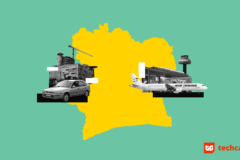This article was contributed to TechCabal by Noel K. Tshiani. Tshiani is the founder of Congo Business Network. The organisation was created in October 2018 in New York to identify and connect decision-makers in the public and private sectors with the goal of promoting entrepreneurship and taking bold initiatives that contribute to economic growth.
When I moved from Kinshasa to Washington, D.C. in 1996, there was no mention of fintech at that time in my community. In fact, I did not have a cell phone until the early 2000s. Access to banking services across America relied on going into a physical branch to do most of the banking transactions that can be done today on a smartphone or a website on the computer.
Ownership of smartphones and access to broadband Internet have transformed how people access and interact with banking institutions in the United States over the past 25 years. Where financial innovation has taken over 2 decades to get in America, countries in Francophone Africa can get there faster if governments and telecommunications companies can make the necessary investments in building faster internet infrastructure.
Smartphone ownership is expected to increase to 64% by 2025 in Sub-Saharan Africa, according to the State of the Industry Report on Mobile Money 2022 recently released by the GSMA. By making it easier for people to open a mobile money account to conduct transactions such as buying telephone credits and paying for a taxi, rates of financial inclusion in Francophone Africa will substantially increase over the next 3 years.
The most developed economies in Asia, America, and Europe have one thing in common: a developed banking system. Countries in Francophone Africa do not have to build a traditional banking infrastructure to achieve financial inclusion, especially among the youth or women.
Mobile money holds the key to increasing access to banking services in rural areas in African countries. That’s why efforts need to be made by central banks, ministries of finance, ministries of telecommunications, and government agencies that collect fees and taxes to instil the culture of digital transactions and discourage people from paying primarily in cash.
Since April 2019, Congo Business Network and the Africa Fintech Summit have partnered for the editions of the events held in Washington, D.C., in Addis-Ababa, Ethiopia, in Cairo, Egypt, and next month in Cape Town, South Africa. The goal has focused on bringing an increased awareness of how fintechs can contribute to the Congolese economy, given the country’s vast geographic territory that makes it extremely difficult to build a traditional bank branch in places outside of Kinshasa, Lubumbashi, Goma, and Matadi.
I was delighted to see representatives from the central bank of the Congo attend the event last year in Cairo when we met with representatives from the central bank of Egypt to learn how they built the Egyptian fintech ecosystem and how we can build from that experience in Kinshasa.
For the 8th edition of the event that will be held in Cape Town next month, the Ministry of Entrepreneurship and of Small Businesses, the National Agency for the Development of Entrepreneurship in Congo, along with the incubator Ishango Startups Center will participate with the intent to meet investors, find business partners, and gain visibility in the media.
For a country of 100 million residents with only 10% of the population that has access to bank accounts, I encourage the Congolese government to continue to simplify regulations for mobile money operators, improve the business climate, and assist fintech startups to develop by providing solutions that solve the needs of consumers and merchants.
With courage, these actions will increase the rates of financial inclusion across the country and contribute to economic growth and job creation for the 70% of the country’s population that is 25 years or younger.





















